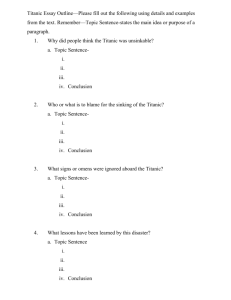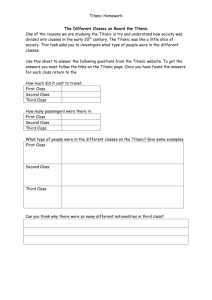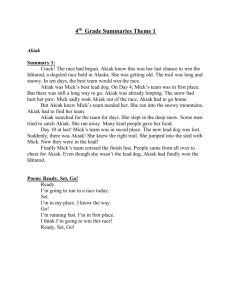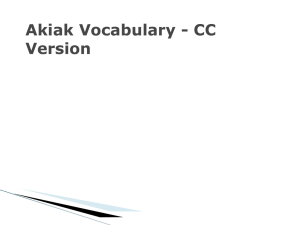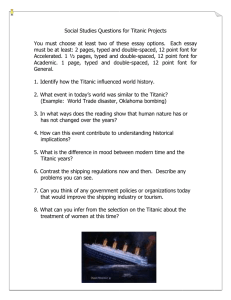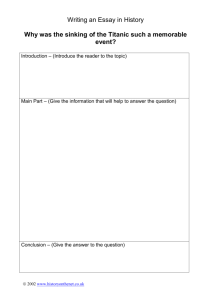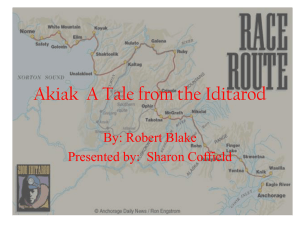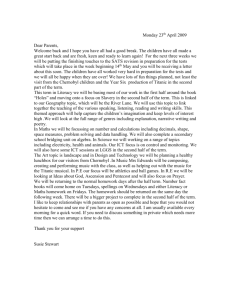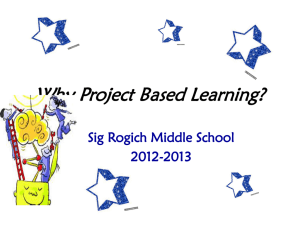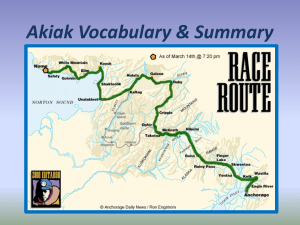English Language Development Lesson Plan
advertisement
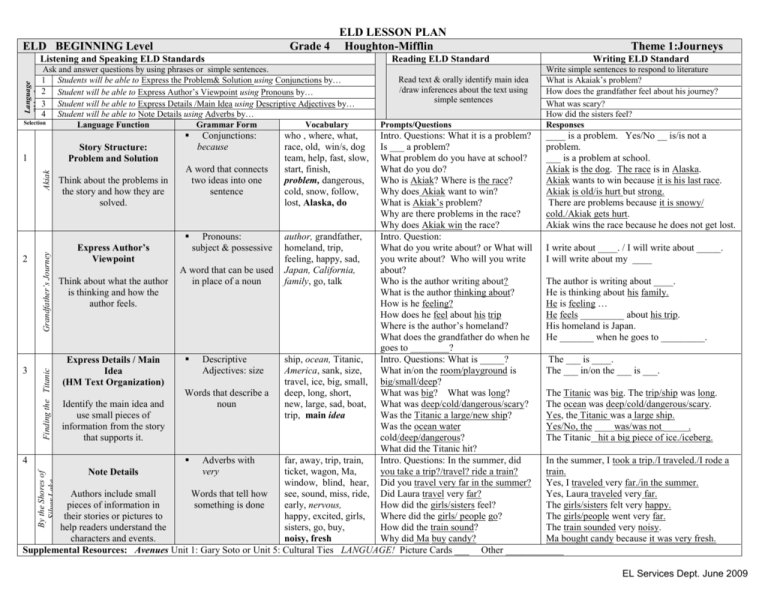
ELD BEGINNING Level Grade 4 ELD LESSON PLAN Houghton-Mifflin Listening and Speaking ELD Standards Reading ELD Standard Language Objective Ask and answer questions by using phrases or simple sentences. 1 Students will be able to Express the Problem& Solution using Conjunctions by… 2 Student will be able to Express Author’s Viewpoint using Pronouns by… 3 Student will be able to Express Details /Main Idea using Descriptive Adjectives by… 4 Student will be able to Note Details using Adverbs by… Selection Language Function Grammar Form Vocabulary Prompts/Questions Write simple sentences to respond to literature What is Akaiak’s problem? How does the grandfather feel about his journey? What was scary? How did the sisters feel? Responses Intro. Questions: What it is a problem? ____ is a problem. Yes/No __ is/is not a Is ___ a problem? problem. 1 What problem do you have at school? ___ is a problem at school. A word that connects What do you do? Akiak is the dog. The race is in Alaska. Think about the problems in two ideas into one Who is Akiak? Where is the race? Akiak wants to win because it is his last race. the story and how they are sentence Why does Akiak want to win? Akiak is old/is hurt but strong. solved. What is Akiak’s problem? There are problems because it is snowy/ Why are there problems in the race? cold./Akiak gets hurt. Why does Akiak win the race? Akiak wins the race because he does not get lost. Pronouns: author, grandfather, Intro. Question: subject & possessive homeland, trip, What do you write about? or What will I write about ____. / I will write about _____. Express Author’s 2 feeling, happy, sad, you write about? Who will you write I will write about my ____ Viewpoint A word that can be used Japan, California, about? Think about what the author in place of a noun family, go, talk Who is the author writing about? The author is writing about ____. is thinking and how the What is the author thinking about? He is thinking about his family. author feels. How is he feeling? He is feeling … How does he feel about his trip He feels _________ about his trip. Where is the author’s homeland? His homeland is Japan. What does the grandfather do when he He _______ when he goes to _________. goes to ________? Descriptive ship, ocean, Titanic, Intro. Questions: What is _____? The ___ is ____. Express Details / Main 3 Adjectives: size America, sank, size, What in/on the room/playground is The ___ in/on the ___ is ___. Idea travel, ice, big, small, big/small/deep? (HM Text Organization) Words that describe a deep, long, short, What was big? What was long? The Titanic was big. The trip/ship was long. Identify the main idea and noun new, large, sad, boat, What was deep/cold/dangerous/scary? The ocean was deep/cold/dangerous/scary. use small pieces of trip, main idea Was the Titanic a large/new ship? Yes, the Titanic was a large ship. information from the story Was the ocean water Yes/No, the ____was/was not _____. that supports it. cold/deep/dangerous? The Titanic hit a big piece of ice./iceberg. What did the Titanic hit? 4 Adverbs with far, away, trip, train, Intro. Questions: In the summer, did In the summer, I took a trip./I traveled./I rode a very ticket, wagon, Ma, you take a trip?/travel? ride a train? train. Note Details window, blind, hear, Did you travel very far in the summer? Yes, I traveled very far./in the summer. Authors include small Words that tell how see, sound, miss, ride, Did Laura travel very far? Yes, Laura traveled very far. pieces of information in something is done early, nervous, How did the girls/sisters feel? The girls/sisters felt very happy. their stories or pictures to happy, excited, girls, Where did the girls/ people go? The girls/people went very far. help readers understand the sisters, go, buy, How did the train sound? The train sounded very noisy. characters and events. Why did Ma buy candy? Ma bought candy because it was very fresh. noisy, fresh Supplemental Resources: Avenues Unit 1: Gary Soto or Unit 5: Cultural Ties LANGUAGE! Picture Cards ___ Other ____________ who , where, what, race, old, win/s, dog team, help, fast, slow, start, finish, problem, dangerous, cold, snow, follow, lost, Alaska, do By the Shores of Silver Lake Finding the Titanic Grandfather’s Journey Akiak Story Structure: Problem and Solution Conjunctions: because Read text & orally identify main idea /draw inferences about the text using simple sentences Theme 1:Journeys Writing ELD Standard EL Services Dept. June 2009 Theme 1:Journeys Reading ELD Standards Ask and answer instructional questions with some supporting elements 1 Students will be able to Express the Problem and Solution using Conjunctions. 2 Student will be able to Express Author’s Viewpoint using Pronouns. Read text & use detailed sentences to identify main idea/ make prediction & support w/details Writing ELD Standards 3 Student will be able to Express Main Idea and Details using Comparative Adjectives. 4 Student will be able to Note Details using Adverbs. Language Function Grammar Form Conjunctions; and &because Finding the Titanic Grandfather’s Journey Akiak 1 3 ELD LESSON PLAN Houghton-Mifflin Listening and Speaking ELD Standards Selection 2 Grade 4 Objective Language ELD Intermediate Level Story Structure: Problem and Solution Think about the problems in the story and how they are solved. Express Author’s Viewpoint Think about what the author is thinking and how the author feels Express Details / Main Idea (HM Text Organization) A word that connects two ideas into one sentence Auxiliary Verbs: could/would/should Help to form some of the tenses and voice of the main verb An adjective which compares two nouns Identify the main idea and use small pieces of information from the story that supports it. By the Shores of Silver Lake 4 Comparative Adjective w/ than Noting Details Authors include small pieces of information in their stories or pictures to help readers understand the characters and events. Adverbs Words that tell how something is done Vocabulary Narrate with some details a sequence of events What problems did Akiak face? Why would the author write about his grandfather’s journey? Which was larger, the iceberg or the Titanic? How did the girls board the train? Prompts/Questions Responses main character/s, story, selection, setting, terrain, in the end, victory, difficult, dangerous, steep, lead, led, Descent/s, climbs versus cliffs What was a problem you have had?/at school? at home? with a friend? What did you do? Who were the main characters in the story/selection? author, grandfather/ dad/father journey/travel, believe/think, feel, tell/explain, return/go back to, long for, homesick, childhood, homeland, Japan, California What would you write about? How would you feel about ____? Why would the author write about his grandfather’s/granddad’s journey/travels? Why would the author believe/think that his grandfather wanted to return to Japan/California? How should the author feel about America/Japan/his grandfather? Why? How should the grandfather/author feel about being with his old/new friends? What in/on the room/playground is bigger/smaller/shorter than a pencil? Which was larger, the iceberg or the Titanic/ ship? Did more people die/perish or survive the wreck? Were there enough lifeboats for the passengers on board? Was the bow safer than the stern? Who had a greater chance of survival? I had a problem at/with ________. I solved it by/ I solved my problem by…./I did not solve my problem by… Akiak and Mick were the main characters in the story/selection. He faced problems with _________ because ______. Some problems during the race were _______ and ____. The Alaskan terrain was difficult because there were dangerous descents, and steep climbs… In the end, Akiak led the team to victory because ___ and _____. I would write about…. I would feel ___ about ___. Alan/the author would write about his grandfather’s journey/travels because he wanted to tell/explain … The author would believe/think that his grandfather wanted to return to __ because … The author should feel that ____ because __. iceberg, large, voyage, search, survive, perish, deck, damage, lifeboat, rescue, crewmen, wreck, bow, stern, England, Alvin , Argo, life vest rapidly, patiently, anxiously, bravely, solidly, celebrate, fidget, afraid, engine, freight, spring, jolting, aisle, happily, arrival, loudly, slowly, incidental: Mother of Pearl, velvet What problems did Akiak face? What were some of the problems during the race? What made the Alaskan terrain/setting a difficult place to have the race? How did Akiak lead the team to victory in the end? What do you do rapidly/patiently/anxiously? How do we line up for recess/lunch? How did Mary wait for the train’s arrival? Describe how Laura waited for the train’s arrival. How did the girls board the train? How did the girls depart the train when they arrived at their destination? How did the train whistle blow? Explain how the girls ate their candy? Supplemental Resources: Avenues Unit 1: Gary Soto or Unit 5: Cultural Ties LANGUAGE! Picture Cards The grandfather/author should feel _______ about _____________. __ is ___er than a _____. The iceberg was much larger than the Titanic/ ship. More people died/perished than survived the wreck. No, there were more passengers than lifeboats. Yes/No, the bow was/was not safer than the stern. The upper class/elite had a greater chance of survival than the lower class. I ______ rapidly/patiently/anxiously when ______. We line up ____ for recess/lunch. Mary waited patiently for the train’s arrival. Laura waited anxiously for the train’s arrival. The girls boarded the train nervously. The girls departed the train happily when they arrived at their destination. The train whistle blew loudly. The girls ate their candy slowly. Other ___________ EL Services Dept. June 2009 ELD ADVANCED Level Grade 4 ELD LESSON PLAN Houghton-Mifflin Language Objective Listening and Speaking ELD Standards Theme 1:Journeys Reading ELD Standards Speak clearly and comprehensibly by using standard English grammatical forms, sounds, intonation, pitch, and modulation but may make random errors. 1 Students will be able to Express the Problem and Solution using Conjunctions. 2 Student will be able to Express Author’s Viewpoint using Auxiliary Verbs. 3 Student will be able to Express Main Idea and Details using Comparative Adjectives. Generate and respond to comprehension questions related to text 4 Student will be able to Note Details using Adverbs. Selection Language Function Akiak 1 Story Structure: Problem and Solution Think about the problems in the story and how they are solved. Grammar Form Conjunctions: however & therefore A word that connects two ideas into one sentence Vocabulary main, primary, character, setting, problem, solution, challenging, overcome/came, triumphant, finish incidental: terrain, descent, treacherous (add other appropriate vocabulary) Prompts/Questions Intro. Questions: What problems might you have at school and how do you respond? What is treacherous/challenging? What challenges can be overcome/not be overcome? Why was the Alaskan setting/terrain challenging? What created problems during the race? 2 Grandfather’s Journey How did overcoming problems help Akiak? Express Author’s Viewpoint Think about what the author is thinking and how the author feels. Auxiliary verbs may, might, must, should, could, would Help to form some of the tenses and voice of the main verb 3 Finding the Titanic Express Details / Main Idea (HM Text Organization) Identify the main idea and use small pieces of information from the story that supports it. By the Shores of Silver Lake 4 Note Details Authors include small pieces of information in their stories or pictures to help readers understand the characters and events. Adjectives Describing Quantity Adverbs of frequency and duration Words that tell how often something is done Writing ELD Standards Independently write simple sentences to respond literature Why was the Alaskan setting/terrain challenging? How might the author feel about Japan? Why? How many passengers wanted to travel aboard the Titanic? How long did the family travel by train? Responses Sometimes my lead breaks therefore, I have to use another pencil. ___is treacherous/challenging. ___ . _____can be overcome/not overcome____________/ The Alaskan terrain had dangerous descents, and steep climbs therefore, it was challenging. There were dangerous descents therefore the Alaskan terrain was challenging. There were ________ therefore, creating problems during the race. Akiak faced many problems however, he still won the race. Akiak overcame many problems therefore, leading the team to a triumphant finish. I might/could/would feel ___ about ___. I might/could/would write___ about ___. Alan/the author would write about his grandfather’s journey so that he could explain … The author would believe/that his grandfather wanted to return to __ because he missed ____ in Calif./Japan. The author might feel that ____was ___ because _______. desire, write, believe/consider, long for, “homesick” journey/excursion, explain/describe (add other appropriate vocabulary) How might/could/would you feel about ____? What might/could/would you write about ____? Why would the author write about his grandfather’s journey/excursion? Why would the author believe that his grandfather wanted to return to Japan/California? How might the author feel about America/Japan/his grandfather? Why? numerous, a handful, several, thousands of unsinkable, discover, passenger, grand stair case, sitting room, signal, distress, submarine, aboard, wreckage, respond, vessel, (add other appropriate vocabulary) long ago, often, seldom, hours at a time, homestead, bristly, telegraph, frightened, conductor, frequently, “see out loud”, Adam’s Apple (add other appropriate vocabulary) How much is a handful?/several? Who has numerous ___? How many passengers wanted to travel aboard the Titanic? How many crew members were aboard the Titanic/ships? About how many lifeboats were on the Titanic and were there enough? How many distress signals were sent and why were these signals important? About how many rescue ships responded to the distress signals? How much has been discovered at the wreckage of Titanic? A handful/several is ___. ___ has numerous/several ___. Thousands of passengers wanted to travel … Numerous crewmembers were aboard the Titanic/ship. Only a handful of lifeboats were on the Titanic which weren’t enough. Several distress signals were sent and they were important because…. Only a few rescue ships responded to the distress signals. What is something that happened long ago? What is something you seldom/often do? When did this story take place? How long did it take the family to travel by wagon/train? Did Laura travel by train before this trip? Tell me more. How often did Laura “see out loud”? Why did she do this? Did young children usually travel on the train for free/by themselves? Why did people usually travel west? How long did it take to reach the homestead? Long ago, _____. Seldom/Often, I _________. This story took place long ago./a long time ago/in the past.. The family traveled by wagon/train for hours at a time. No, Laura never traveled by train because… Laura usually/typically “saw out loud” because… Yes/No, young children usually traveled free/didn’t travel free/ never traveled by themselves on the train. People usually traveled west to acquire a homestead. Frequently, people traveled days at a time to reach the homestead. Supplemental Resources: Avenues Unit 1: Gary Soto or Unit 5: Cultural Ties ______ has been discovered at the wreckage of Titanic LANGUAGE! Picture Cards ___ Other _____ EL Services Dept. June 2009
